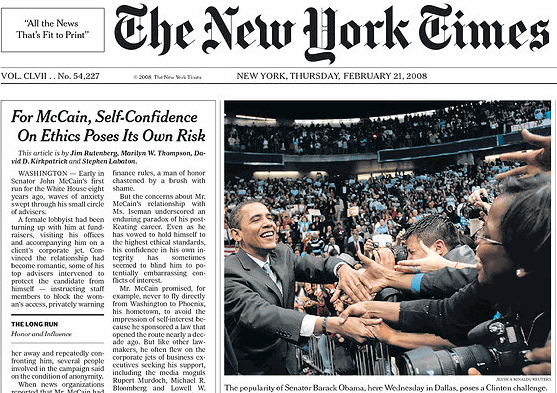Does The 2012 Election Really Matter? Probably Not As Much As You Think
The cable networks and the political parties will tell you otherwise, but the 2012 isn't quite as important as they're saying.
Russ Roberts argues in a Boston Globe column [free registration required for full access] that next year’s election isn’t going to matter nearly as much as the partisans on both sides of the aisle would like us to think it does:
HOW IMPORTANT is the 2012 presidential election? Imagine being visited in 2008 by a time-traveler with news of the future. He tells you that in 2011, America is still in Afghanistan and Iraq, but has also added bombing Libya to its list of military adventures. Guantanamo Bay remains open. Osama bin Laden is dead – killed in a covert operation on an ally’s soil. On the economic front, unemployment is sitting at 9.1 percent, but had been as high as 10 percent. The Bush tax cuts have been extended.
You would reasonably conclude that Republican John McCain, the foreign policy hawk who proudly proclaimed his ignorance of economics, must have been elected.
That’s not to say that the outcome of the 2008 election was irrelevant. I doubt McCain would have pushed anything close to ObamaCare. He probably would have spent less than Obama did to fight the recession. But my point is that candidates often disappoint us. They respond less to what we perceive as their principles and more often to the political winds.
But surely, some might say, we are headed toward an epic battle over the size and scope of government, even more so if the election ends up being a race between President Obama and Texas Governor Rick Perry who, at least according to their supporters, represents polar opposite positions in that debate. Leaving aside the fact that this debate is one we’ve been having since the founding of the Republic, Roberts correctly notes that history suggests that the actual differences between President A and President B won’t be all that substantial:
The next president, Republican or Democrat, will spend less than we’ve been spending. But not a lot less. So those Tea Partiers are in for disappointment. Oh, we might go back to the level of government spending way back in the Dark Ages of 2007. But you have to go back to Calvin Coolidge to find a Republican president who presided over a smaller government when he left office than when he arrived – Congress doesn’t like taking away things from voters who’ve become accustomed to free lunches paid for by other taxpayers.
(…)
Who wins the election of 2012 will matter. But it’s not likely it matters nearly as much as the partisan fever suggests. My advice is to be less partisan. Care less about who wins. That will soften the blow when your favorite candidate or party betrays you in response to political reality.
Robert’s view is cynical, but largely correct. With only a few notable exceptions in American history, the outcome of Presidential elections doesn’t seem to have the impact on the direction of the country that people think it will. Obviously, the decisions that individual Presidents make will have an impact on history but in broad policy terms the actual differences are pretty minimal. Major changes in direction are the exception in American politics, not the rule.
So, I’d recommend taking Roberts’ advice. Tone down the rhetoric. Barack Obama isn’t a socialist and Rick Perry isn’t a theocrat. In fact, they’ve probably got more in comon than either one of them will ever be willing to admit. The 2012 election is, in all likelihood, not the most important election ever, and we’re going to be back having the same arguments we are now no matter who takes the oath of office on January 20, 2013.







I think the big deal is the whoever wins in 2012 will get two or three Supreme court picks.
@ponce:
And, because of the politicization of Court picks post-Bork, we’ll get mostly milquetoast moderates or people with no discernible opinions on anything (including the color of the sky)
I agree, but there’s still a big difference between milquetoast conservatives and milquetoast liberals.
Replacing Scalia with a weak liberal would still be a big deal.
“And, because of the politicization of Court picks post-Bork, we’ll get mostly milquetoast moderates or people with no discernible opinions on anything”
But Alito and Roberts are both “post-Bork”, and they are both very, very, very conservative, not even close to being milquetoast or moderate.
@Socrates:
They were, however, cyphers. And it’s worth noting that neither appointment had a significant impact on the Court’s balance. That’s not going to be true with the next round of resignations, regardless of who the President is.
This is one reason why I was early on hoping Mitch Daniels would be one of the GOP contenders, as he has often been said to having Coolidge’s fiscal discipline.
While I agree that “toning down some of the rhetoric’ ” would be helpful, I disagree with some of Russ Robert’s assumptions posted in the above excerpts, in speculating about a McCain versus an Obama presidency.
Yes, McCain most probably would have continued to engage in wars abroad, including Libya. However, I think he would have managed the wars differently and with better leadership and precision: taking the advice of his generals in Afghanistan and Iraq, and implementing a no-fly zone sooner in Libya, which would have brought that crisis to the conclusion that Obama couldn’t do (days and weeks, not months) because of his ‘dithering.’
I also believe McCain would have handled the economic problems in wiser ways: not calling for a far-flung stimulus adding to our already high deficit with poor job growth. He also would have been more inclined to work in concert with small business, giving them viable incentives, bringing us out of a recession rather than having a slip-and-slide kind of growth we’ve seen all throughout Obama’s term. And, then there would not have been the odious Obama type of coercive health care waiting in the wings. McCain would most likely have pursued a less aggressive kind of reform, dealing with perhaps tort reforms, allowing interstate health insurance purchases (which would made insurance premiums more competitive), etc.
Should a republican become POTUS in the 2012 elections, along with a more conservative Congress, I think you will see less of the New Deal type politics and more legislation aimed at growing the economy through tax reform (not soaking the rich), business incentives, and a decrease in the EPA’s choking regulations that inhibits business formation, and consequently new jobs from coming on the market. Most importantly, that factor called “confidence” will be renewed by a new more philosophically conservative president orchestrating government policies that are less aimed at class warfare than simply putting the United States back on it’s fiscal feet.
When it comes to the economy it won’t make much difference. Neither the R’s or the D’s can bring back the “good old days.” The growth we have experienced for decades was possible because of cheap oil and we have reached peak cheap oil. Yes there is plenty of oil left but it will be too expensive for the transportation system we have become accustomed to. We are going to be forced to move to a de-centralized economy – more and more things produced locally. That will create jobs but it will be fought by the plutocrats to the end.
@Ron Beasley:
I recall from other posts, Ron, that you believe the days of growth have slowed, if not altogether vanished. However, there are others who do not share your belief in the doctrine of ‘peak oil.’ And, if this idea, that fossil fuel resources are in decline, was proven to be untrue, then I would say your thoughts that this country has peaked is based on a false premise, as well.
Just wonder if Everything you’ve heard about fossil fuels may be wrong.
According to this article it’s a matter of using more advanced technology, and going beyond the horizons of prefabricated peak oil assertions that may provide assurances we are not on the verge of energy depletion, unless partisan politics of the left eventually rules the day.
With the latest Solyndra debacle, one wonders if the government isn’t manipulating data and erroneously subsidizing unworthy green ventures in order to create a world more in the form of what they ideologically believe, than on the reality around them.
China invested over $50 billion in green technology last year, up 39% over the previous year
http://www.chinadaily.com.cn/bizchina/2011-04/11/content_12301475.htm
Are the Republicans who have caused America’s economy to stall going to use their fanaticism to allow us to fall even further behind China (and Germany)?
@ponce:
The Solyndra debacle refers to a slanted analysis of the financial worthiness of this green energy venture, so it would fit into Obama’s goal of pushing green energy jobs. And, in good conscience, putting the original Solyndra investors in front of the taxpayers, in being responsible for their debts, is throwing the American taxpayer under the bus, while absolving Obama backers from any accountability. That’s not how responsible business projects are structured in the real world.
Also, one doesn’t compete with anyone successfully by ‘wishing’ to be competitive through subsidies from others. You have to find legitimate and sustainable means to do this. The government is only stacking the green job deck with other people’s money. That deck is now crumbling under all the subterfuge.
I’m sure more deals, like the one made with Solyndra, are to follow.
Jan,
Your side has invested close to a trillion U.S. taxpayer dollars in Iraq and Afghanistan.
Decency would say you guys should hold your tongues over a minor investment mishap on the D’s part.
If you guys continue to strangle America’s attempts to enter the world’s fastest growing industry just so your masters in the primitive oil and coal extraction businesses can make a few more bucks you might not be forgiven.
As much as I agree that the Iraq and Afghanistan wars were a huge boondongle, and that something like Solyndra is small (actually microscopic) potatoes in comparison, I can’t help but remember that almost all of the Democrats in the house voted for those wars. And that a Democratic president is keeping the Afghanistan one going …
Of course, that’s just assuming by sides you’re referring to D’s and R’s – if not, I apologise.
Obama is just a few months from completely winding down Iraq, and he’s shutting down Afghanistan as fast as he can.
Off topic, I wonder if the Palestinians are pushing for statehood now as a ploy to make their country the next front against Western hegemony…pretty good timing if they are.
While that is true in regard to Afghanistan, that is incorrect regarding Iraq…
Let’s reward people who buy “green” cars: no sales tax, no “hidden” taxes – such as on mileage, batteries, or other. “Green” will include natural gas cars – clean burning and cheaper than gasoline. Even some convenience stores are putting in electric hookups for charging so people can charge their cars while enjoying coffee and a hot dog. Hydrogen? I know some people who are trying hydrogen cells (that they have built themselves) that supplement fuel. A factory in SC uses hydrogen powered fork lifts. Continue tax incentives for purchasing “green” cars. Gas use peaked a few years ago in the US and continues to go down.
@ponce:
Investment? No, not really. It was government playing like a Business God in anointing a business plan that was under-qualified to even receive loan guarantees, which ultimately would be paid for by people (when it went under) other than those who created the unsatisfactory business plan, in the first place.
Comparing this example of capital croynism to war costs, started under any administration, is childish. After all, then you could go back to the Kennedy/Johnson administration and it’s Viet Nam engagement. No, there is no comparison, only you trying to conjure up some kind of weak justification for the Obama screw-up.
Not really.
It’s childish to think crony capitalism wasn’t one of the main reasons we went to war with the Muslim world.
And in the long run, our economic competition with China is far more important to America’s future than our trillion dollar war against Muslim goat herders.
I think the analysis is cynical AND bullshit at the sametime. It’s mostly glib nonsense. Obama has the opportunity to be in a lot more places than Libya. Does a Mccain admin hold back Israel from striking Iran? Does a Mccain admin press more on Russia’s involvement in Georgia? How does a Mccain admin react to North Korea’s blustering? Hell, we can even go for things that aren’t on the front page but that still dominate foreign policy. How do we know that a Mccain admin doesn’t get belligerent about Taiwan?
And that’s just skirting the edge of foreign policy. The possibilities and opportunities for fucked up responses to these events are endless. To throw out some DC pundit BS about Obama getting Bin Laden is so ridiculously myopic. Yes, there are checks on the president’s foreign policy powers but the president can do a whole lot before those checks are enacted.
Yes, the stakes truly are high in every election.
@ponce:
All you give are nice little sound bites, morsels of leftist talking points, but omit addressing the process behind selecting Solyndra as being worthy on its own merits in receiving federal loan guarantees.
Then you go on about competing with China, as if that alone validates a back room government deal with someone over here making solar panels. How long can we keep subsidizing a company who was touting a business model that would never succeed? Why not just buy the solar panels from China, and be done with it? It’s not like we don’t continue to buy everything else from them. Why is the line in the sand having to be solar panels?
Going to war in the ME is a whole other issue, that you bring in as a distraction. Why not talk about the Viet Nam war, if that is where you want to go with this. Ah yes, but that was under a democratic administration. Not much Republican-bashing material there.
Jan,
You are a puzzle.
Once in a while you sound almost human, but then you’ll turn around and return to regurgitating the dumbest fringe right propaganda from the likes of Rush Limbaugh and Glenn Beck.
Are you upset that normal Americans gave your side’s hyperventilating reports of Solyndra the giant yawn it deserved?
@ponce:
You’re a puzzle as well, ponce.
I am commenting on Solyndra’s obvious loan guarantees being granted, not as a result of being a good business gamble, but mainly because it fell into the right progressive ‘green’ model, with the right political doner behind this company. If that doesn’t bother you, then there is nothing I can say or do.
And, comparing it with controversial wars, is inane and accomplishes little to further the discourse, when the topic is about our economy and what kind of businesses should we be pursuing, and who should be creating them, to produce substantial jobs in this country.
I am saying that I think Solyndra was an example of capital croynism at it’s very worse, adding insult to injury when you have the people picking up the burden of this known failure. Furthermore, I think the government should get out of the business of dictating who does business, and let the free market decide their fate more the Ivy League intellectuals in Washington.
I don’t know who you think are ‘normies’ in society. However, for those people going bankrupt, without a job, losing their homes, I seriously doubt they are looking kindly on this Solyndra deal and how it was given so much insider privileges by the Obama Administration. Perhaps it is you who don’t have any ideas who normal people are or what they think.
As for Limbaugh, I don’t listen to him. He’s way to conceited for my tastes. Same for Beck.
Jan,
If you link to some posts you have made in the past criticizing, say, all the campaign donations Haliburton made to the Republicans, I’ll be happy to take you seriously.
Gee Jan, thought class warfare was a non sequitur. Or is it only relevant when a conservative uses it?
There may be little effect on the economy, unemployment, etc., but I’m far more concerned about the impact on social issues. Having no actual plan about the economy other than to funnel more money to the top 1%, Repugnicans would quickly move on to setting our country’s social conscience back 50 years by pulling out conservative hobby horses and riding them around the room. We would soon have anti-gay Constitutional amendments, a crumbling wall between church and state, and any number of new ways to discriminate against vulnerable minorities.
And they are probably not happy about Perry’s crony capitalism, or Bachmann lining her pockets with taxpayer dollars. But we won’t be hearing from you about those, will we?
@ponce:
I wasn’t doing any blog posting in the days of Haliburton. And, besides, it’s pretty tiring to be talking about the ‘now’ of Solyndra, and when arguments dry up on your side, you start reaching into your bag for an historical moral equivalent to be able to say, “Well, that person did that, so it’s perfectly acceptable for my guy to do the same thing.” In my world, if both a R & a D were aware and approved of a deceptive business deal then they both would receive criticism.
Also, my memory of Haliburton is foggy, but I don’t recall them borrowing money from the government, going into bankruptsy. Chaney sold all his stock in the company when he became VP, and although there were rumors and gossip going around of contract bias to Haliburton, was anything proven in these rumors? The very name Haliburton, though, has been given all kinds of terrible connotations by liberal leftists. However, if this company really deserved all the canon fodder it received, I really don’t know.
@anjin-san:
Again, another case of, if you can’t find any more avenues to defend your guy, then find a distraction to make your case.
I’ve already voiced doubts about Perry, regarding his deals in Texas. And, the “Bachmann lining her pockets” statement is just a burp of indigestion from you, because you have nothing more to add.
@jan: Isn’t it amazing how not a single right-wing poster on this site ever listens to Rush Limbaugh, and yet they are all able to parrott every one of his talking points?
I’m not really that interested in “defending my guy” to you. You don’t have an open mind, and your posts consists mainly of cut & pastes from right wing websites and homilies about how special you are.
If I don’t write a manifesto about Bachmann, it’s because I have better things to do. Her “do as I say, not as I do” approach to limited government has been detailed many times over.
Because sooner or later, we need to stop relying on China for both our deficit financing and our products. We need to be able to make things again. Particularly things that would help lead us on the path toward more sustainable energy. Contrary to the fairy tale puff piece you cited, peak oil is real, as is the increasing demand for oil from China and India, and if we don’t invest in renewable or green energy like China and Europe are doing, we’ll be screwed in a whole variety of ways.
Presidential elections do make a difference. I think a Gore administration would have been a far cry different from the disasters we got under GW Bush. And I’d be willing to bet we’d be at war with Iran under a McCain administration.